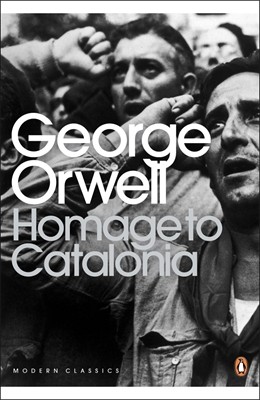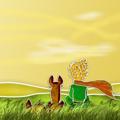sol2070@velhaestante.com.br (e)k George Orwell(r)en Homenagem à Catalunha liburuaren kritika egin du
Relato poderoso e crucial
5 izar
( sol2070.in/2025/05/homenagem-catalunha-orwell-filme-terra-e-liberdade/ )
Consagrado pelo clássico 1984, o autor britânico George Orwell conta sua experiência como soldado voluntário na Guerra Civil Espanhola em Homenagem à Catalunha (Homage to Catalonia 1938, 312 pgs). Apesar de não aparecer nos créditos, 80% do clássico filme Terra e Liberdade (Tierra y Libertad, 1995), de Ken Loach, parece diretamente baseado nesse livro (mais sobre o filme no final).
Até hoje, Orwell costuma ser confundido como antissocialista[^1], devido à sua posição à esquerda da esquerda, de se opor a estruturas autoritárias mesmo que sejam supostamente de esquerda, como a União Soviética. Sua participação no conflito revolucionário espanhol teve papel-chave para sua visão política.
Depois que uma ampla coalização de esquerda — incluindo desde o Partido Comunista, passando pela esquerda moderada, até sindicatos anarquistas — ganhou a eleição espanhola em 1936, militares fascistas tentaram um golpe para impedir o governo e tomar o …
( sol2070.in/2025/05/homenagem-catalunha-orwell-filme-terra-e-liberdade/ )
Consagrado pelo clássico 1984, o autor britânico George Orwell conta sua experiência como soldado voluntário na Guerra Civil Espanhola em Homenagem à Catalunha (Homage to Catalonia 1938, 312 pgs). Apesar de não aparecer nos créditos, 80% do clássico filme Terra e Liberdade (Tierra y Libertad, 1995), de Ken Loach, parece diretamente baseado nesse livro (mais sobre o filme no final).
Até hoje, Orwell costuma ser confundido como antissocialista[^1], devido à sua posição à esquerda da esquerda, de se opor a estruturas autoritárias mesmo que sejam supostamente de esquerda, como a União Soviética. Sua participação no conflito revolucionário espanhol teve papel-chave para sua visão política.
Depois que uma ampla coalização de esquerda — incluindo desde o Partido Comunista, passando pela esquerda moderada, até sindicatos anarquistas — ganhou a eleição espanhola em 1936, militares fascistas tentaram um golpe para impedir o governo e tomar o poder. Houve resistência e os estados espanhóis ficaram divididos, resultando numa guerra civil até 1939, quando fascistas liderados pelo general Franco instalaram uma ditadura que durou 36 anos.
Muitas pessoas de outros países se juntaram à luta anti-fascista e à revolução, como Orwell, já que esse embate tinha consequências globais. Em diversas áreas resistentes ao golpe, como a Catalunha, a luta também era uma revolução anticapitalista em andamento.
O objetivo não era apenas derrotar os fascistas, mas também abolir o capitalismo e estabelecer uma sociedade igualitária, o que aconteceu por um período que varia de meses a anos, dependendo da região. Empresas e terras foram todas coletivizadas e as pessoas comuns passaram a se autogovernar, com o mínimo de estruturas hierárquicas, enquanto a guerra seguia. Isso aconteceu em grande parte devido aos sindicatos anarquistas e outras divisões mais revolucionárias da esquerda, que estavam à esquerda do governo esquerdista.
Mas o governo anti-fascista passou a se opor à revolução — essas pessoas eram chamadas de “comunistas“, devido à influência do partido comunista e da Rússia —, querendo controlar tudo de cima para baixo, afirmando que a coletivização e a descentralização do poder prejudicariam a guerra. Eram chamados também de “comunistas de direita”.
Ou seja, além de lutar contra os fascistas, a esquerda se dividiu entre quem apoiava o governo contrarrevolucionário e o lado revolucionário — formado por anarquistas e as alas de socialistas radicais como o POUM. Essa divisão envolveu conflitos armados, mortes e prisões em massa.
Foi a uma milícia do POUM que Orwell se juntou quase por acaso, ao chegar na Espanha. Isso no final fez com que fosse perseguido pelos “comunistas de direita”. O governo de esquerda jogou o POUM na ilegalidade e caçou seus membros, mas Orwell conseguiu escapar da Espanha com sua mulher.
O livro destrincha esse conflito interno da esquerda em dois apêndices. Para quem for ler, recomendo ler o Apêndice 1 antes, para não se perder nas siglas de partidos e milícias, e entender quem é quem.
Essa política toda também é relegada aos apêndices porque o relato foca na experiência em primeira mão de Orwell, que tentou se distanciar das brigas políticas internas enquanto serviu. Queria apenas derrotar fascistas e tinha vagos “ideais socialistas”. Seus companheiros o chamavam de ingênuo. Ele só reconheceu a verdade disso depois que terminou vítima do partido comunista.
Considero central esse aspecto de como o socialismo estatal sabota e bloqueia revoluções genuínas, mas o mérito maior do livro é mesmo a experiência subjetiva de alguém que lutou nas trincheiras catalãs.
Orwell detalha a precariedade das condições na linha de frente, como frio congelante constante, armas defasadas e defeituosas, imundície, infestação de piolhos, falta de comida, cigarros, roupas etc. Sua tácita aceitação completa diante do fato de realmente poder morrer a qualquer momento acaba sendo impressionante. Também descreve como era combater em uma milícia sem hierarquias e desigualdade.
Apesar de ter passado por poucas situações de guerra total, balas perdidas eram a principal causa de mortes e ferimentos. Ele mesmo levou uma no pescoço e ficou incapacitado por semanas.
Não deixa de ser uma jornada infernal, da qual ele admite, paradoxalmente, lembrar com saudosismo. Principalmente pelas amizades, o “espírito espanhol“ e a incomparável sensação libertadora de desfrutar brevemente de uma utopia viva.
‘Terra e Liberdade’
→ trailer
O filme Terra e Liberdade (1995) está disponível na íntegra com boa definição no Youtube (mas com legendas em português apenas na falha versão automática).
Marcou-me bastante na juventude. Não sabia que era tão baseado na experiência de Orwell. Descobri porque, ao terminar o livro, quis rever o filme. As principais diferenças são:
- Não poderia faltar um romance para amenizar e cativar, mas sem pieguice e até emociona.
- As trincheiras são muito mais limpas (assim como as pessoas) e aconchegantes.
- A perca da ingenuidade do protagonista, quando ele percebe a armadilha do “comunismo estatal”, acontece sem que precise fugir do país. Ele chega a voltar às trincheiras mais esclarecido.
- A vilania dos “comunistas de direita” é exagerada, sugerindo que a guerra foi perdida por essa interferência. Orwell jamais faz essa afirmação, apesar de acreditar que isso certamente sabotou a luta anti-fascista.
- É muito mais emocional e trágico. O relato de Orwell é quase jornalístico, apesar de que quando seu grupo é acusado de traição e de aliança com os fascistas, ele não se conforma e solta o verbo, levando em conta quantos de seus companheiros se sacrificaram.
- Pouco aparecem a igualdade e a coletivização que se estabeleceram nas áreas liberadas e na milícia.
Para saber mais sobre esse conflito revolucionário, crucial no contexto anti-autoritário e anticapitalista, o filme é imperdível. Acaba exigindo certa familiaridade com a política (na primeira vez que vi, não entendi completamente, ficando mais absorvido pelo drama, mas o livro esclareceu tudo).
É um dos melhores retratos cinematográficos de uma revolução histórica, sendo um dos filmes mais lembrados da extensa lista de dramas anticapitalistas do diretor inglês Ken Loach.
[^1]: Sobre o suposto antissocialismo de Orwell e uma rica análise de 1984, de Thomas Pynchon: sol2070.in/2022/11/Sobre-1984




